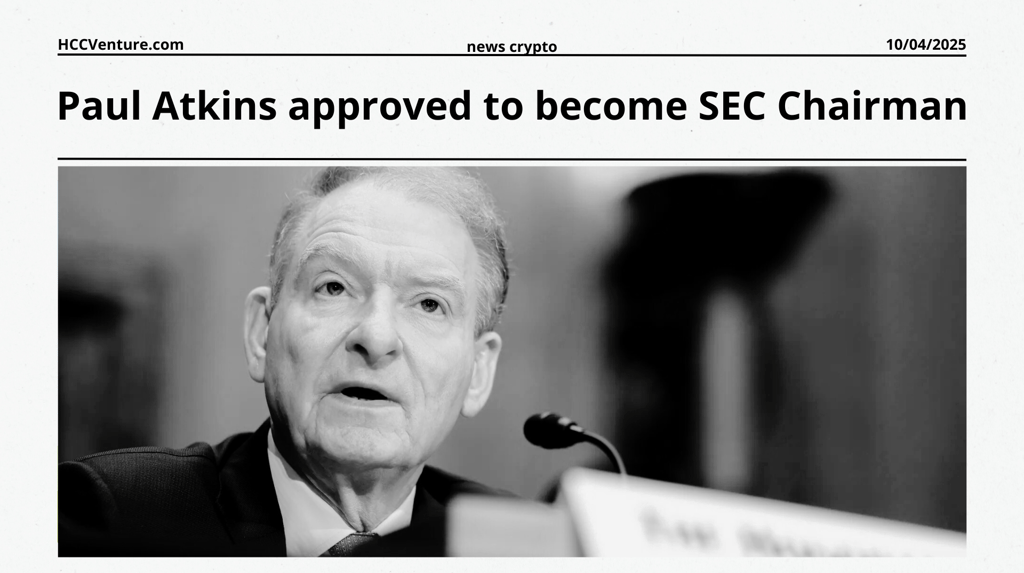Paul Atkins Confirmed as SEC Chairman: A Positive Sign for the Cryptocurrency Industry?
The US Senate has officially approved Paul Atkins as the new chairman of the Securities and Exchange Commission (SEC) with a vote of 52-44. This decision not only ends the controversial leadership period of Gary Gensler but also opens up hopes for a friendlier approach to the thriving digital asset industry.
4/10/20252 min read


The Journey to SEC Chair
Paul Atkins is no stranger to finance and regulation. He served as an SEC Commissioner from 2002 to 2008 under President George W. Bush, a period in which he left his mark with a balanced regulatory mindset that prioritized innovation while maintaining transparency. After leaving the SEC, Atkins founded Patomak Global Partners, a financial advisory firm whose client list includes major banks, cryptocurrency companies, and decentralized finance (DeFi) projects. This hands-on experience gives him insight into both traditional markets and the emerging fintech sector.
Atkins’ nomination by President Donald Trump in late 2024 was welcomed by the crypto community as a positive sign. With his open stance on digital assets, he was expected to change the direction of the SEC – an agency that was heavily criticized for its “regulatory by suppression” policy under Gary Gensler. His confirmation by the Senate today officially confirms that Atkins will lead the SEC in a challenging but also promising period.
Background: SEC Under Gary Gensler
To understand the significance of this event, it is necessary to look back at what the SEC has experienced in the more than three years under Gary Gensler's leadership. Since taking office in 2021, Gensler has taken a hard-line approach to the crypto industry, suing major companies such as Coinbase, Binance, Kraken, and Crypto.com for alleged violations of securities laws. He has also issued warnings to blockchain projects such as Ripple, Consensys, and many other DeFi and NFT platforms.
However, this strategy has not always been successful. The SEC has faced numerous regulatory setbacks, such as ending its investigation into Ethereum and abruptly approving Ethereum ETFs without clear regulatory action. These inconsistent actions, combined with the collapse of major projects such as FTX and Terraform Labs, have left the SEC with a reputation for being inconsistent and hindering the growth of the industry. Gensler has even been sued by 18 US states for alleged abuse of power, damaging the trust of both lawmakers and the crypto community.
Atkins: The Changemaker?
Paul Atkins’ arrival is expected to turn things around. With his practical experience and pro-innovation stance, he could bring a clearer regulatory framework, rather than continuing with rigid enforcement measures. Many experts believe that Atkins will prioritize building transparent regulations that both protect investors and encourage the development of cryptocurrencies – an area he once called “an important driver of the future of American finance”.
Some lawmakers have expressed optimism about the change. Rep. Tom Emmer, a prominent cryptocurrency advocate, has noted that Atkins has the insight needed to end “regulatory repression”—a strategy he says has stifled America’s innovation potential. If implemented, Atkins’ new approach could pave the way for approval of financial products like the Solana ETF or XRP, which have been stalled under Gensler.
Impact on Cryptocurrency Market
The initial reaction to the news of Atkins’ Senate confirmation was positive. Bitcoin, Ethereum, and several major altcoins posted modest gains, reflecting investor confidence in a more favorable regulatory environment. However, it is too early to say whether Atkins will completely change the landscape. The transition of power at the SEC and the development of new policies will take time, especially as the agency struggles with internal problems after a turbulent period.
Still, there is no denying that the event marks an important turning point. If Atkins delivers on his promises, the United States could cement its position as a global center for financial innovation, attracting more capital and talent to the crypto industry. Conversely, if he fails to deliver, the industry could continue to face long-term instability.
Explore HCCVenture group
HCCVenture © 2023. All rights reserved.

Connect with us
Popular content
Contact to us
E-mail : sp_contact@hccventure.com
Register : https://linktr.ee/holdcoincventure
Disclaimer: The information on this website is for informational purposes only and should not be considered investment advice. We are not responsible for any risks or losses arising from investment decisions based on the content here.


TERMS AND CONDITIONS • CUSTOMER PROTECTION POLICY
ANALYTICAL AND NEWS CONTENT IS COMPILED AND PROVIDED BY EXPERTS IN THE FIELD OF DIGITAL FINANCE AND BLOCKCHAIN BELONGING TO HCCVENTURE ORGANIZATION, INCLUDING OWNERSHIP OF THE CONTENT.
RESPONSIBLE FOR MANAGING ALL CONTENT AND ANALYSIS: HCCVENTURE FOUNDER - TRUONG MINH HUY
Read warnings about scams and phishing emails — REPORT A PROBLEM WITH OUR SITE.
